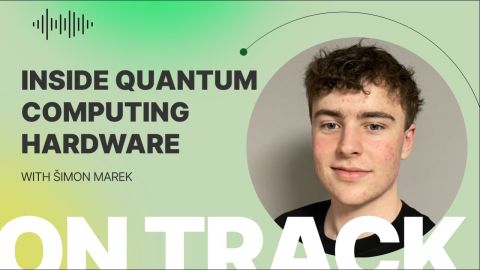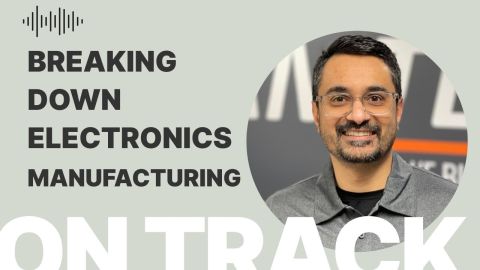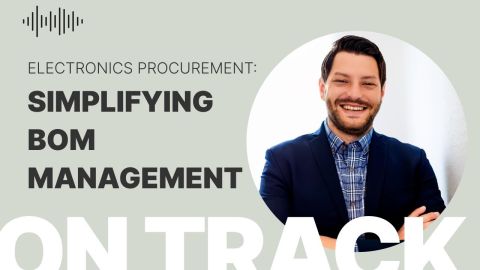The Benefits of Diversifying PCB Industry Supply Chain

To develop a resilient ecosystem, understanding the root cause of the PCB industry supply chain shortages is a must.
In this episode, Travis Kelly, president and CEO of Isola Group will help us understand what is going on with the current supply chain in the electronics industry. Travis will also give us his insight into the new legislation introduced in the US Congress: Bipartisan Bill to Bring Electronics Manufacturing to America and Strengthen Supply Chains.
Tune in, or listen on the go. Stay up to date with the latest discussion in the PCB Industry.
Listen to the Podcast:
Download this episode (right click and save)
Watch the video:
Show Highlights:
- Travis's introduction and a brief overview of PCB manufacturing and fabrication in the United States
- About 20 years ago, the US produced roughly 26% of the world's PCBs; today, that number is down to 4%
- There used to be over 2000 fabricators in the late 1990s and early 2000 to less than 140 today
- What are the main drivers of the PCB industry supply chain shift?
- The industry recognizes the benefits of working in a global economy; Travis explained the need to diversify manufacturing capabilities in certain regions
- Identify what makes sense to have a robust supply chain domestically, e.g., 5G, 6G, medical, aerospace, obviously defense, banking infrastructures
- Travis stresses that there are ways to reduce the overall cost of PCB and electronics production and still manufacture domestically
- Looking at the entire ecosystem and pointing out vulnerabilities outside of just chips and advanced packaging, how to address each one?
- Focus on a balanced approach, not over-indexing; strategically, where does it make sense to build brick and mortar to have a resilient, robust, and trusted supply chain?
- What does it mean to bring manufacturing onshore?
- Building a strategic and competitive PCB industry ecosystem requires more than just automated facilities; it’s also essential to invest on:
- Workforce development – hiring and building up a talented workforce domestically
- Promote STEM in schools
- Create awareness of PCB industry design and manufacturing as part of the sought after career in tech
- Travis gives insight into the new legislation introduced in the US Congress: Bipartisan Bill to Bring Electronics Manufacturing to America and Strengthen Supply Chains
- He emphasizes the importance of understanding the root cost of the imbalanced supply chain vs. addressing just the symptoms
- Continue to educate the Whitehouse on understanding the issue extensively and not just focusing on the semiconductor shortages
- Considering the cost of the end products (for consumers) when navigating and drawing solutions
- The role of the Printed Circuit Board Association of America (PCBAA) in the industry: educate, advocate and legislate
Links and Resources:
Connect with Travis Kelly on LinkedIn
Follow PCBAA on LinkedIn
Visit Isola Group’s website
Eshoo & Moore Introduce Bipartisan Bill to Bring Electronics Manufacturing to America and Strengthen Supply Chains
Connect with Zach on LinkedIn
Full OnTrack Podcast Library
Altium Website
Download your Altium Designer Free Trial
Learn More about Altium enterprise solutions
Claim the special offer for Podcast listeners only
Travis Kelly:
What I'm saying is by putting in automated facilities to stay competitive against other countries, you're going to have to increase that skillset. And that means more focus on stem and our schools, more focused on workforce development and really hiring and building up a talented workforce domestically that can help us be successful against competition that once again may have certain subsidies that makes it very difficult for domestic manufacturers to compete against.
Zach Peterson:
Hello, everybody. And welcome to the Altium OnTrack podcast. I am your host, Zach Peterson. And today we are sitting down with president and CEO of Isola Group, Travis Kelly. He is also the chairman of the printed circuit board association of America. He's been quite active recently lobbying for the industry, and we're very excited to talk to him, especially in the wake of some new legislation that has been introduced in the US Congress. Travis, thank you so much for being here today.
Travis Kelly:
Yeah. Thank you very much, Zach, for having me.
Zach Peterson:
Absolutely. This is a side of the industry that we don't talk about much on the podcast, but I think this is a monumental, maybe not monumental, but a big turning point for the industry. And I'm hoping the momentum can be maintained, especially with legislation coming out around semiconductors. It's interesting now to see something coming out around printed circuit board manufacturing as well.
Travis Kelly:
Yeah, I agree, Zach. I think more people and that's government in the public sector are becoming more conversant on the ecosystem, which we know as microelectronics and a lot of the focus to your point is on semiconductors. However, we have a saying at the PCBAA that chips don't float, meaning that even if you build the foundries in the United States to hopefully circumvent some of the global supply chain issues, all of us are experiencing, you still have numerous issues if you can't embed those chips onto a printed circuit board. And I think as we continue to educate and advocate and obviously legislate for our industry, people are becoming more aware of not only the nuances within the microelectronics industry, but just how complicated it is.
Zach Peterson:
Yeah, I absolutely, and I agree with you. I think there is kind of a disconnect, but maybe before we talk about that, you could introduce yourself to the audience, give us a sense of your background and how you became to be involved in all of this and how you got to involved in the printed circuit board industry.
Travis Kelly:
Yeah. I appreciate that, Zach. So I am the president and CEO of Isola Group and Isola Group is American based. We have facilities all over the world, but we have two very large facilities in the United States and we make material called laminate and customer prepreg that is crucial to the manufacturing of printed circuit boards. And ultimately I've been the CEO and president now for over three years of Isola Group and working very closely with some of the largest PCB fabricators in the United States, we saw a significant need that there has to be more attention given to this declining base. So just some quick stats that I think can help educate and make your population of viewers more conversant on this topic, PCB worldwide production revenue is estimated to be over 60 billion in 2021. All right. So last year, over the past 20 years, PCB production has moved away from the United States and a lot of us know that, however, at an alarming rate.
Travis Kelly:
At one time, the US produced roughly 26% of the world's PCBs. Today, that number is down to 4%. If I want to quantify that in terms of overall fabricators and PCBA, you're basically looking at over 2000 fabricators in the late 1990s, early 2000 to less than 140 today. So that's draconian when you think about such a paradigm shift in the industry itself, while the PCB manufacturing today, to your point is garnering new momentum based on the global supply chain issues. COVID really shined a light on a lot of our weakness as a domestic manufacturing base. Not only for micro electronics, but pharmaceuticals, industrial equipment that I think there is a lot of momentum right now, relative to what we need to do as an industry to ensure that not only can we have a robust domestic supply chain, but also a trusted one as you get into reliance on foreign PCB manufacturing, it's a problem for the US companies that rely on PCBs for their products.
Travis Kelly:
So when you think about some of the disruptions that not only have we seen since 2020, but also we're going to continue to see not only because of container shortages, as well as the rolling blackouts in China because of their zero COVID policy and the war in Ukraine, we're going to continue to see these global disruptions. And I think right now is the perfect time to bring awareness to the overall industry government that something has to get done. And it's extremely important to ensure that we have a trusted and resilient ecosystem as it relates to printed circuit boards and overall the microelectronics industry.
Zach Peterson:
Yeah, I absolutely agree. And I think it's interesting that it took the failure of a just in time supply chain that was highly concentrated overseas to really drive this. Back in, I think 2016, when the Trump administration began, there was kind of this renewed focus on onshoring, but everybody questioned it. It was across different industries. It wasn't just electronics. And now we're in this position where I think the geographic clustering of your manufacturing capacity has really revealed a major weakness, which is if people can't go in and work in the factories, then you don't have manufacturing capacity anymore, especially if it's all clustered overseas.
Travis Kelly:
Yeah, that's right, Zach, and you touched on an important point just there, because I think in the prior administration, I think sometimes it was looked through a myopic lens where people were saying, "Hey, it's onshoring and reassuring," and that's not what we're advocating for. We as an industry recognize that we work in a global economy, and there's certain benefits too by diversifying your manufacturing capabilities in certain regions. What we're saying is the number's not a hundred percent. That's a myopic view. And I think that's a heavy lift to convince people, even our own industry that that makes sense. But I also know the number's not 4%. So, we have to define what is resilient. A lot of the times I think the counter argument to what we're trying to accomplish is, "Hey, is it really necessary to have printed circuit boards for your toaster oven coming from the US?"
Travis Kelly:
I would make an argument that is not critical. That is not a critical component of what we're advocating and legislating for. What we're saying is if you look at certain sectors, where do we want to ensure that we have the trusted and resilient supply chain? What are those sectors, that obviously would be defense, aerospace, medical, banking. We understand that as you look at data, data farms, data servers, and the importance of having continuity and not having certain issues happen in the financial sector, that's extremely important. So really when we look at what is critical and what's defined as critical infrastructure like 5G and ultimately 6G, that to me would make sense to have a robust supply chain domestically. We're not asking, we're not advocating to have every toaster built in the United States. We are saying let's carve out what we think as a nation's extremely important and tackle those issues.
Zach Peterson:
Sure. I think what you brought up here with the objectively right number. I mean, what is that objectively right number? Because if you look at semiconductors and you look at the stats, there's less of a differential between what happens domestically versus what happens overseas. I mean, it's not 4%. It's a bit higher, but it's certainly less of a differential. So for printed circuit boards, what is the right number? Because I think the danger here is that we get on this big onshoring kick, and there's so much momentum that all of the new capacity is at home. And then we're just in this situation again, where we've just over concentrated capacity. We've just done it locally instead of overseas. Do you see that as a danger?
Travis Kelly:
Yeah. I think you don't want to over index on one or the other. I think as we continue to get our voice around what makes sense to the overall industry become more clear on what the right number is, but I enjoy numbers. I think the facts shall set you free. So when we look at just defense spending, so there is some favorable language in the national defense authorization act, as it relates to printed circuit boards. If you look at defense spending and you look at what the US domestic PCB suppliers and material suppliers like Isola Group contribute, it's roughly the 3% of the overall share of what we do. I think it would be hard for many domestic PCB fabricators, assemblers, and material suppliers to invest capital expenditures, CapEx dollars towards such a small volume, especially when you think about defense volume, because it's somewhat transient. You'll have peaks and valleys depending on what's happening.
Travis Kelly:
So it's not a consistent demand signal. So it's hard to write an investment thesis from a business perspective to support volume that kind of ebbs and flows. What does all that mean? That means if we look once again at what do we think is critical? And if we all agree that critical would once again, be infrastructure 5G, 6G, and the evolution of that, medical, aerospace, obviously defense, banking, and there's several other ones that we could put together, you could potentially get to an aggregated demand of roughly 26%. If you were to look at all those industries and try to solve for ensuring once again, not only a trusted supply chain, but a resilient one. And then I think you start getting to the right number. You start getting to the right number. Okay. If it's not 3% in terms of just defense work, but it's roughly 26%, I think a lot of the CEOs of the PCB fabricators and the material suppliers can actually sit down and read in investment thesis saying, "No, we need to build brick and mortar."
Travis Kelly:
And by the way, it doesn't all have to be the US. It can be allied countries, but build brick and mortar to support that demand signal of roughly a quarter of the overall demand for PCBs. That to me resonates. And I think as we continue to work with industry, as we continue to work with government, I think there is a way to solve this equation without being myopic saying everything has to be onshore. And as well as saying, "Hey, 4%'s the right number," because we know because of COVID to your 4% is not the right number. And that's one reason we're struggling as a microelectronics industry. Furthermore, to your point earlier, semiconductors, you can build the foundries in the United States, but if less than 3% of advanced packaging happens in the United States, when those chips come out of those foundries, they still have to be sent overseas for packaging. So that's a significant problem as well. So it's really looking at the entire ecosystem saying, "Where are those vulnerabilities outside of just chips and advanced packaging, and how do we address each one of those?"
Zach Peterson:
Sure. And when you say allied countries, I mean, this could be North America could be Western Europe, could really be anywhere that is generally friendly in terms of trade.
Travis Kelly:
That's right. Because I get fearful that you don't want to overindex. That's typically what happens if it's a knee jerk reaction, and then you find unintended consequences when you do over index. So I think we have a nice balance view, we being the printed circuit board association of America saying, "Look, yes, we probably have to build brick and mortar in the United States. That makes a lot of sense. But then when you look at allied countries, Germany, potentially Japan, Canada, Mexico, how can we diversify enough so you're not putting all your eggs in one basket, because you could have the same issue again."
Travis Kelly:
Right now our issue is the fact that most of our material and our manufacturing comes from Asia. If you were to put it domestically, you still have acts of gods like tornadoes and hurricanes that could wipe you out as well. So once again, it's always about a balanced approach, not overindexing one way or the other and figuring out strategically, where does it make sense to build brick and mortar to have a resilient, robust supply chain as well as a trusted one because I don't want to miss that point to ensure that we can continue to run as a nation for these critical applications?
Zach Peterson:
Sure. And I wonder if you could maybe put some context here because I think when people think or hear the word onshoring or reassuring, they think we're going to close down the factories over there and move all that capacity over here. And that's not always the case, is it? It's maybe looking at the growth projection for the industry as a whole and saying, "If we're going to plan new capacity, maybe we should plan some of it domestically instead of internationally."
Travis Kelly:
Yeah. And that's a great point, Zach. You're a hundred percent correct. That doesn't mean closing current facilities regardless of where they are located. It can mean for new demand. If you go back to my example of if you were to aggregate the demand signal from six or seven defined critical applications and get that market share up to 26%, that would be incremental gain for a lot of our, not only our constituents as part of the PCBAA, but the industry as a whole. So you would expect with incremental demand, you would build in addition to what you currently have. So it's not a zero sum game where it's plus one minus one you would expect to see a just a broader footprint from our membership base.
Zach Peterson:
Sure, sure. Yeah. I think that all makes sense. And I think that's really the right way to talk about shifting your capacity geographically, not necessarily closing it all down overseas and bringing it home, but maybe intelligent planning of where you set up new capacity, especially for the larger players.
Travis Kelly:
Yeah because there's still economic concern. I think you and I briefly spoke about this a couple weeks ago. One thing we do know is no one learns anything from history, right? Everyone forgets. And I think the key here is we still have to remain competitive as an industry. So that would be difficult to do if everything was domiciled in one certain country, be it the US, Canada, what have you. So we have to be strategic about where we do build the brick and mortar. Also, what new technology is out there to help us be competitive against certain countries that may subsidize their own internal industries. So point being Isola Group built a state of the art facility in Chandler, Arizona back in 2019 and 2020, and it's fully automated. So if you were to go into a plant that we built 10 years ago, it would be very different than what you're seeing now in Chandler, because of all the automated presses and robots. The point being that there are ways you can reduce the overall cost and still manufacture domestically.
Travis Kelly:
And not only that it helps with skilled jobs. So when you think about automation, not only do you still require a lot of the teammates that we have from an hourly side, but then you get into controls engineering, get into electrical engineering. And the key here is Zach and it's extremely important. We spent some time already talking about brick and mortar, but when you offshore, you're also offshoring that technological knowhow, right? So it's not like you're just building a plant someplace else. You're also building up their talent and really reducing the talent needs here domestically. What I'm saying is by putting in automated facilities to stay competitive against other countries, you're going to have to increase that skillset. And that means more focus on stem and our schools more focus on workforce development and really hiring and building up a talented workforce domestically that can help us be successful against competition that once again may have certain subsidies that makes it very difficult for domestic manufacturers to compete against.
Zach Peterson:
You're bringing up a lot of points that were brought up in IPC's leadership lost report. And then there was a combined department of Homeland security and department of commerce report that kind of echoed a lot of these issues with workforce development, education, lack of investment in R and D for automation, controls, engineering, those types of things. You're bringing up a lot of this stuff that I think has been known for a lot of years within the industry. Now is being recognized a bit more broadly within the US government. And then I'm wondering what really tipped the scales. What actually got somebody in Congress to actually listen up and realize that it's not just the semiconductors, it's also the printed circuit boards that matter for electronics manufacturing. Because I think when people think about tech, they think about technology, right?
Zach Peterson:
What do they think about? Well, they think Netflix, Facebook, Google. They think the big software giants and then maybe they get a little deeper and then they think Intel, AMD and Nvidia, and then what? They don't ever go down to the printed circuit board. It seems to me there's still this perception that circuit boards are kind of an overblown way to wire together, computer chips. And that was, I'll be honest, the perception I had about 20 years ago when I was still in college. So I'm wondering what tips the scales for somebody in power and what's the message that resonates.
Travis Kelly:
Yeah. So you're spot on, Zach and my kids, when they think about technology, it's cyber security, it's Nvidia, it's chips. It's the big software. I say that our industry is not overly sexy, but it's absolutely critical. And I think what's resonating with people, Zach and just allow me two minutes here, because it's so important. You have the printed circuit boards, which people will say, "Do you mean the green pieces of plastic?" There's so much more than that. That is what a chip gets embedded into. Without that printed circuit board and the different pathways for the electronic signals that carries the ones and zeros, nothing works. When you actually bifurcate this discussion and get into, "Okay, well what is a printed circuit board?"
Travis Kelly:
And then you tear off that soldering, the green plastic, the soldering plate, you look, then it becomes laminate and prepreg. And once again, that's something Isola does and people don't really know what that is. And I'm not overly sure they need to, but they do need to understand that Isola is the only US material supplier left that has the broad suite of products that can cover FR4 material, HSD. We cover the gambit, but we're the last ones in the United States. To scare people even more and I've had this discussion with the executive agent pointed by the US government that oversees the PCB industry, if you look at what laminate it is, and it's basically woven glass, we get woven glass and you have copper, here's a scary point, Zach.
Travis Kelly:
There's only one yarn company left in the United States that makes yarn, that has to be woven into the woven glass. And that's a GY and there's one copper supplier left in South Carolina. My point being as you further bifurcate this discussion and really educate people on the ecosystem itself, it is scary how decimated the industry has been, meaning that if one of these suppliers were to go out of business, it would be nearly impossible to produce a printed circuit board in the US. Now sure, you could go and get woven glass from Asia or yarn from Asia. You could potentially get copper from China, but once again, then we go back. Well, do you really consider that a robust supply chain? Do you really consider that a resilient domestic supply chain? So people have to your point, how do people start waking up?
Travis Kelly:
I think as we continue and we meet with the White House and a lot of different functions of the government, obviously DOD, we're back in Washington next week to have further meetings with Congress. People are opening their eyes because I think it's somewhat scary to see how vulnerable we are when you really get into who are the suppliers and what does it take to make a final system? We had a good discussion with some defense primes and some Congress people two weeks ago in Washington. And they look at things from a system perspective. So if it's a missile system from Raytheon, when you start tearing that apart and looking at the different components all the way down into the precious materials that's required, it starts raising a lot of eyebrows when you see that some of the critical components that are needed, there may only be one sole provider, one sole source left in the US.
Zach Peterson:
Well, it seems that the messaging has been effective to some extent, because just this month or in May, I should say there was a bill introduced, I believe it's the supporting Printed Circuit Boards Act or Supporting American Printed Circuit Boards Act of 2022 introduced by representatives Issue and representatives Moore. And it's a bipartisan sponsorship, which I think is remarkable.
Zach Peterson:
I think usually when you think American manufacturing, you think about one side of the aisle and not the other. So it seems that the messaging here is hitting where it needs to, which is both sides of the aisle. And now you've got the introduction of a bill that intends to address some of these problems and hopefully make the industry at least domestically a bit more competitive. What's your sense about the bill? Do you think it has a chance of actually passing? Do you think it's too little too late? Well, I'd like to get your thoughts on this.
Travis Kelly:
Yeah. So first and foremost the Printed Circuit Board Association of America is grateful to both representatives Issue and Blake Moore for taking on this important issue. And it's quite interesting because the bill supports really couple different things, expansion of US production capacity of integrated circuit, substrates, the relocation of facilities from certain countries to the US or allied countries. It's a great question. Do I think it's too little too late? I think it's the right start. I'm very happy that the bill was introduced compared to where the PCBAA's only been around for a year. And when I look at the consequential things that we've accomplished in such a short period of time, I'm very pleased with some of this early successes and the fact that printed circuit boards are even being discussed at this level's fantastic.
Travis Kelly:
We've had members, members of the PCBAA that took a direct, I'll say route with the new legislation that was introduced, helping push it through with both representatives. Obviously, we have sister organizations like US PAE, obviously IPC that are also proponents for this new bill. So really just everyone working together to ensure that we get PCBs out in the forefront on the critical nature of what is needed to ensure that these systems work. So is it too little too late? No. Is it the solve all? Absolutely not, but it's a beginning. And we need all our members, all IPC members to continue to urge Congress to pass this. It's hard for me to sit here based on I'll say the geopolitical environment and forecast, will it be passed?
Travis Kelly:
What I do know is obviously there's a lot of different polling happening. Obviously, the midterm elections are up for debate. A lot of people are saying it's going to be a red wave, but then with the Supreme Court league will that steer it more back towards the Democrats? I wish I had a crystal ball. I think anyone that makes a prediction right now is truly guessing. Here's where I'm comfortable though. I'm comfortable that this is a bipartisan issue. I do believe with the continued shutdowns in China and those ports continuing to stack up, so manufacturers can't get containers and we haven't even really seen the ramifications of that yet. We've all been dealing with it for two years, but with the port issues that continue to Mount in Asia and with the further shutdowns, I don't think we've experienced the true impact as of yet.
Travis Kelly:
I think we will experience over the next couple months. I don't see this issue going away. So I think because it's a bipartisan issue, I think because of the war in the Ukraine, because of the issues throughout China, with the zero COVID-19 policy, and then ultimately just trying to get any type of material into the US. I'm not even mentioning the inflation, everything that's happening from a macro economic standpoint. I struggle to believe that this bill won't be passed some time in the next several months. Now several months could be well after midterms, but I just think there's so much momentum behind it and I think the general public understands now the risk we all face when we don't have a resilient supply chain.
Zach Peterson:
Well, I agree. I think it's much more top of mind for the everyday person. That's a resilient supply chain, however, you want to define that is important, especially when you have stories on the news every night about how you can't buy a Ford F-150 or something like that, these crazy things about auto chip shortages. And I think that's what really brought it to the forefront was with the automotive sector, my concern here is that we've overdone it on the semiconductor subsidy or the semiconductor, the chips act, and the related legislation, that's gone to support the semiconductor industry, but we're just going to underdo it on the PCBs, because the PCBs are kind of an afterthought when as you've rightly stated, the reality is the chips don't matter if you can't connect them together on something that properly routes signals around the board. So I'm wondering what is it that's going to take that kind of shift in mindset and possibly help maintain the momentum towards making the printed circuit board industry competitive again for the US and I guess for our allies and partners more broadly?
Travis Kelly:
Yeah, Zach and I think that was really one of the catalysts to form in the PCBAA. When we look at our three pillars, educate, advocate and legislate, you're hitting the nail in the head. Because the focus, the headlines in the Wall Street Journal and pretty much any paper is always about semiconductors because that's what the consumer sees. I want my F-150. I used to be able to go to the lot. I could pick it up that day and drive it home. And now the lots are bare. I'm paying more for a used car than when it was new five years ago. That's what resonates with people, because it's hitting their own personal pocketbook. We need, we being the PCBAA, to continue to educate and advocate and did we over index on semiconductors?
Travis Kelly:
Possibly, obviously it is an issue. And I think it is an issue that needs to be resolved. Does 52 billion, should I just go to foundries or does someone need to look at the ecosystem? And actually we talked about this in Washington a couple weeks ago with certain Congress people and certain constituents. How do you take that bill and add to it? Or how do you bifurcate the 52 billion to start beefing up the other sectors that are all part of micro electronics? Because I think the key here is chips. Don't float. So you're not addressing the root cause. It's no different than running a manufacturing company. When I meet with my engineers, should we have an issue? You have to identify the root cause of the issue to put in corrective action. If you're not doing that, then you're just addressing the symptoms.
Travis Kelly:
So a symptom is I can't get my F-150 today. That's not the root cause. So then people say, "Well, okay, the root cause is the chips. I can't get the chips." That's not the root cause. It's part of it. But part of it's the advanced packaging that can only be done in Asia, only 3%'s done here and not at scale. So you're not going to be able to get 400 or 500,000 F-150s out by producing or doing advanced packaging in the states because we don't do it at that scale. We can, but we don't today. What about the printed circuit boards? So once again, it's looking at what Congress has already approved and saying, "Okay, does it make sense? How do we divvy up the funds to make sure the entire ecosystem is resilient to your point?"
Travis Kelly:
Because if we're just going to over index on semiconductors, that's great. We'll have a lot of foundries, and I know there's articles out there and I'm on top of a lot of them, there's arguments saying we're going to make the supply chain worse because now they're now they're produced in the United States. Now you have to send them to Asia and then send them back as opposed to just having to produced in Asia and send them here. So there's a whole argument that we're actually going to tie up to the global supply chain, even worse than what it was because we're building foundries and nothing else.
Travis Kelly:
So I do know it's resonating because we're hearing it when we go to Washington. People are understanding more and more each day that, "Hey, this is a bigger issue than just I can't get my F-150 today," but we have to continue as the PCBAA to educating. And we spend a lot of time almost a week a month in Washington just doing that, making sure that the not only the house, but the Senate, the armed services committee, even the White House was brief that this is just a bigger issue than semiconductors.
Zach Peterson:
You brought up a great point about shipping overseas, because you're right. If you can make all the chips you want locally, but if there's no local assembly capacity, then you have to ship that all out overseas and you still have the risk of IP exposure and then you have to ship it back. From what you've just said not only does that tie up the supply chain, which I can see and understand the argument for that, but how does that impact the cost of the end product? Because if I make it over here, let's just assume that you don't add any cost to the actual device, the semiconductor that you produce over here, but you have to ship it out overseas and then you have to ship it back.
Zach Peterson:
And let's assume that there's still tariffs in place on both ends. In that case. How does that impact the competitiveness? If we just said, "Hey, we can be competitive on costs by cutting out all these shipping costs and tariffs and everything else by producing it locally and by assembling it locally," is that something that also resonates? Is this then become kind of a cost issue?
Travis Kelly:
Yeah, it has to. It has to because ultimately in 2019, so pre-COVID, you could get a shipping container. So when you think about the large vessels and you see the big still boxes, that's what I mean by when I say container. Those containers were anywhere from $2,000 to $2,500. So you would lease that container. You would put your material in it. Material could be a printed circuit board, it could be semiconductor, whatever it is. I mean, you can put clothes in it, toys. Toys go in it. So you would lease that for roughly $2,000. That was pre-COVID. Right now it's costing anywhere between $20,000 and $28,000. So when people are saying, "Geez, I'm paying more for groceries." You're paying more for everything. It's not all because of shipping containers, but that cost has to go somewhere.
Travis Kelly:
So when you say, Travis, not only would this be less of a resilient supply chains or an economic impact, a hundred percent, there is. Because right now, if you're importing semiconductors that have been packaged, you're arguably paying, let's say $20,000 just to use round numbers. That's just coming from Asia into the United States. If you build the foundry here and you don't do packaging and you don't do PCBs and you do have to send it back to Asia. Now you're spending $20,000 to go back to Asia and $20,000 to come back to the US to go into your F-150 to use your example. So now it's 40 grand.
Travis Kelly:
So you don't need to be economist to say this is going to cost us more money. And I think that's why you're seeing a lot of articles right now where people are saying, "Hey, time out. We fully appreciate that semiconductors should be protected. We should do something domestically. But if you're only going to address that symptom and not the root cause, in theory," and I know you could probably argue this one way or the other, but in theory, you're not only going to spend more money now and make things cost more, you're also making the supply chain less resilient because now you got to go both ways.
Travis Kelly:
And not only is the cost of containers gone up, but also it's hard to find a container. So what's happening is even Isola, when we build material, we can achieve, let's say a customer's lead time, but then you may not be able to get the container for three weeks out because right now, a lot of those ships are either at ports that are struggling because of the zero COVID policy or the war in Ukraine, or we're doing slow steaming.
Travis Kelly:
If you remember, it used to be on the news quite a bit, you would see all the ships out on the West Coast waiting to get into port. If you look now, are you flying to Los Angeles? You'll see ships, but you won't see as much that used to be on the news. That's not because there isn't an issue. That's because they've all been told to slow steam. Slow steam means they just go across the ocean slower, so you don't have that build up. So it's not in the public eye, but it's still happening. Just you don't see it. So when you take a lot of these things into consideration and you just focus to your point on semiconductors, I would have a strong argument saying we're not addressing the root cause. And we potentially have an unintended consequence where we're going to make things worse. And look, it's easy for me to sit and just to be clear, it's easy for me to sit here and poke holes in everything that's happened.
Travis Kelly:
And that's not my intent. I'm very happy with the government. I'm very happy. I think that they're addressing the issue with semiconductors. I think the industry as a whole understands that there is an issue with the industry and what do we need to make sure we have secure and resilient supply chains? All I'm saying is we have to do more. But like I said, I'm very happy that the supporting America PCBs Act was introduced. I think that's a huge win. I think a year ago, no one knew what a PCB was, except for a handful of us that are in the industry.
Travis Kelly:
Now it's being debated at that level, which is fantastic. Now we're having the discussions around semiconductors. Now we have automotive companies having discussions. So I'm very happy with what I'm seeing. What we're trying to do at the next level is just make people conversant on the entire ecosystem. Let's talk about the one yard supplier that's left in the US. Let's talk about the one laminate and prepreg full suite of services, supplier that's left in the US, the [inaudible 00:37:14] supplier. It's a bigger issue that we just need to make sure we're all sitting down and discussing doesn't mean that you're going to swing one way or the other, but let's make conscious decisions moving forward on what makes sense as an industry overall.
Zach Peterson:
There's been a recent trend of Apple and Tesla and other companies making their own chips, doing the design and then probably contracting with another fab house, TSMC or whoever else to get it made. I'm wondering, would they ever take the approach of actually manufacturing their own boards because they're the ones that need all of that packaging for whatever it is they're building. Would they ever take that approach? Would Ford do it? Would some other OEM in the US do it?
Travis Kelly:
Yeah. Once again, I think you're hitting the nail in the head. I always tell people that innovation is sometimes created out of crisis. I've heard the saying don't let a good crisis go to waste. And I think that's what we're seeing now is you're going to see to your point vertical acquisitions, either acquisitions, or you're going to see greenfields where a company that is very reliant on semiconductors and printed circuit boards will look, especially if they have a lot of cash and if they can get the knowhow, they may want to make sure that at least from their standpoint, they have a resilient supply chain. Without saying the name, there are right now, OEMs that we're aware of that are doing just that. So where they would acquire a printed circuit board, they are now breaking ground to start producing their own.
Travis Kelly:
I think you will see more of that because if you're one of these larger Fortune 100 companies that is reliant heavily on certain, and it doesn't even have to be semiconductors, but any sole source supplier or difficult supply chain issue, should they have the means, and many of them do the ones you've mentioned, I think that would be a good contingency plan if you're a CEO running one of those companies. Because I think as we've seen, a lot of these companies are struggling just because they can't get supply. Demand is there, the supply's not, and that's really the catalyst behind inflation. You want to see inflation have demand outreach supply, and then you start paying $20,000 for containers. Your beef gets more expensive. It's hard to get pharmaceuticals and list goes on and on. You look at oil. So we're seeing the results of that. And I think some of these companies will look at, "Okay, let's start thinking about vertical acquisitions." And acquisitions can either mean building the technology yourself, or acquiring a company just to ensure that you have that resilience supply chain.
Zach Peterson:
It is a major shift. And I think it's encouraging to hear that there are OEMs that are pursuing that now. So I think we'll have to leave it at that. And I hope that you and I can discuss some of these issues in the future, should any of that vertical acquisition start happening in mass. Travis, thank you so much for joining us today. This has been a really enlightening discussion, and I know we've kind of talked economics here in policy, but I think it is really important for the industry to get out ahead of this stuff.
Zach Peterson:
And hopefully the PCBAA efforts will produce much more legislation like this in the future to help keep American circuit board manufacturing competitive. What we'll do is, in the show notes, we're going to link to some information on PCBAA, and we'd invite everybody to check that out and learn more about what this important organization is doing for the industry. Travis, thank you so much again, and to everybody that is out there listening, make sure to like this video, hit the subscribe button to see future episodes and don't stop learning, stay on track. We'll see you next time.










